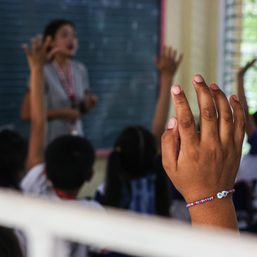SUMMARY
This is AI generated summarization, which may have errors. For context, always refer to the full article.

MANILA, Philippines – Hormones in contraceptive pills can be reduced by as much as 92% and still be effective, mathematicians have found in a new study.
In the study, where researchers analyzed the hormone levels of 23 women aged 20 to 34 with regular menstrual cycles, it was found that estrogen-only contraceptives could work just as effectively even if hormone doses were reduced by as much as 92%.
As for progestrone-only contraceptives, hormone doses can be lowered by 43% and still have the same effectivity, they found.
The study was undertaken by University of the Philippines (UP) mathematics associate professor Aurelio de los Reyes V and PhD mathematics graduate Brenda Lyn Gavina, along with their collaborators Mette Olufsen of the North Carolina State University, Suzanne Lenhart of the University of Tennessee, and Johnny Ottesen of the Roskilde University of Denmark.

In the study, the researchers tracked natural hormone levels and the effect of hormones taken through contraceptives through a modified menstrual cycle model they developed.
Using math, they determined the lowest amount of hormones needed to prevent ovulation. Apart from the finding that lower hormone dosages can still be effective, the researchers also found that taking the pills before the tenth day of the menstrual cycle can be just as effective as a daily dose in preventing pregnancy.
“With the rapid development of new implants and injections providing continuous administration, there is great potential to implement new treatment scheme minimizing dose,” the researchers said. The study was published in the PLoS Computational Biology on April 13.
UP professor De Los Reyes said that their study suggests an “effective and cost-efficient hormonal contraceptive administration,” and contributes to a “longstanding objective” of safer contraceptive through reducing the dosage of hormonal contraceptives.
“We also hope to build on the current model to investigate reproductive health concerns in women like polycystic ovarian syndrome (PCOS) and ovarian cysts. We would like to caution that our model is not directly translatable to clinical setup (or actual patients) as of yet, but the principles and its proof of concept could be potentially implemented to achieve safe and cost-efficient contraception,” said De Los Reyes.
Birth control pills are the most popular modern contraceptive method among women in the Philippines as of 2022. However, some pill users have to deal with side effects like spotting, bleeding, sore breasts, nausea, or headaches.
According to a 2022 article from the Australian Prescriber journal, hormonal contraception is also known to precipitate or perpetuate depression in some patients. Some older generations of birth control pills that contain ethinylestradiol are linked to severe mood problems, while newer generations containing physiological forms of estrogen may be more tolerable, with a weaker link to mood problems.
More than 8 million Filipinos used modern birth control methods in 2020, according to the Philippine Commission on Population and Development.
Reproductive health in the Philippines is a multidimensional issue, as adolescent pregnancy remains prevalent, and not all women are empowered to make decisions over their own bodies. ([READ] ‘Nandiyan na’: Young Filipinas accept pregnancy as duty, but stigma remains – study)
The country’s reproductive health law, despite being passed over a decade ago, remains to have gaps in its implementation, such as the rollout of comprehensive sexuality education. – Rappler.com
Add a comment
How does this make you feel?











There are no comments yet. Add your comment to start the conversation.